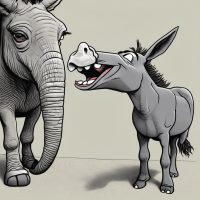I’ve been stuck in what seems like an infinite dopamine loop. I can’t even remember when it began, but I know when it expanded to take up my whole life like some kind of blob… only I don’t have a cast of exciting young people. Well, maybe I do since I am a teacher and father, but, still, there’s no Steve McQueen in my life. How is that even fair?
Hi. My name is Jack and I’m a binge-watcher. I’ve been binge-watching TV shows. It started small at first. Only an episode or two at a time and only during the weekends. You know. For fun. Then it started to be a couple a times a week in the evenings… and before you know it, I’m watching four five episodes a night every night!
Now, I’m looking for excuses to get begin watching. I’ll only watch an episode during dinner, I tell myself. Then it’s, Well, I may as well watch one when I’m cleaning up. And after that, it is One more won’t hurt! Pretty soon it’s eleven o’clock and I’m falling asleep in front of the computer… and I’ve gotten nothing done!
The Revenge of Dopamine
It took me a while to realize that it’s the dopamine that’s got me hooked. There’s an odd satisfaction that comes from watching an episode, a season, a series. You haven’t really accomplished anything, but it is as satisfying as having actually accomplished something, maybe even more.
At the end of an episode, I get that feeling of just one more. I want to watch the next installment. It’s maddening. The end of the show starts coming up. You ever notice that you can always tell when the episode is starting to wrap up? And, if the episode ends on a cliffhanger, ferget about it; the next one is a gimme. You gotsta watch that shit. You gotsta KNOW.
The Mesolimbic Dopamine Reward System
The end of the thing activates the liking-reward centers of the brain. Regular readers know that this is the mesolimbic dopamine reward system. Mesolimbic because it is in the middle of the limbic system. The limbic system being the emotional center of the brain or the lizard brain. It connects stuff together and motivates you to do it in one way or another. Either through habit and automaticity or through emotion, liking, fearing, or angering. Dopamine because it uses the neurotransmitter dopamine to connect the neurons in the circuit together. So, if you take a drug that mimics dopamine, it floods the brain with dopamine, which activates all the dopamine receptors and gets those circuits going, meaning the reward circuit, so like cocaine is addicting. Reward because when you feel like you did good, this is the area of the brain that is being stimulated.
We like rewards. After we get one reward, we want another one. When pressing a button provides an electrical stimulation of a rat brain, rats will press that sucker up to 7,500 times an hour (ten times per minute) and do in preference to food or sex.
This mesolimbic dopamine reward system is some powerful stuff. That’s why Fox News, TV shows, electronic games, and social media use strategies to activate it and keep you watching, playing, or participating. It’s called persuasive design. And, man has it ever designed my persuasion. It’s got all that persuasion by the short, and curlies and it ain’t lettin’ go.
Persuasive Design
I kept thinking that when I got to the end of a season, it could end. You know because if you get to a natural breaking point, it is easier to change habits. #ScienceFact. It’s why New Year’s Resolutions are so popular… and seldom work? Oh, never mind. Those junctures do make for places that are easier to change habits, though.
But, persuasive design, cliffhanger, and you’re on the hook for another season! Darn you BJ Fogg! Darn you to heck!
By the end of the series, though, you have that post-football season depression. It’s become such a habit this endless obsessive watching that you restlessly search the streaming sites for the next series.
Of course, if there were something happening in our world that was worth reporting on like the end of Roe v. Wade, Putin’s war in Ukraine, or the continuing adventures of the 6 January Commission, I’d be able to write insightful posts applying psychology to all these situations. But, no we live in a boring world where nothing is really happening, so I just roll over and pull the comforting quilt of binge-watching made for binge-watching TV series tight to my chin and order more deliver.

Share this post with the binge-watchers in your life!
And, help me kick the habit by:
- Sharing this post!
- Liking or rating this post!
- Commenting on this post!
- Following the blog or joining our email thingee!
Image Attribution
“Blob fish” by Dodie is licensed under CC BY 2.0.
Categories: Mesolimbic Dopamine System



















great topic – tv is big money — as is fast food, and so on & so on — companies spend & spend & spend to continually research how to better hook us…
LikeLiked by 1 person
Howdy da-AL!
There is an area of psychology started by BJ Fogg called persuasive design that studies how to activate the liking-reward center of the brain and keep it engaged. These folks are directly responsponsible for the ways that food and entertainments keep us on the hook for just one more. It is insidious and should be a violation of the code of ethics.
Huzzah!
Jack
LikeLiked by 1 person
exactly
LikeLiked by 1 person
Howdy Ten Bears!
Thanks for the link! It is much appreciated!
Huzzah!
Jack
LikeLike
The Bell. Rings your (and mine) bell just as it rings the barely literate bare-footed rubes sprawled drooling Pavlovianly across a “couch” the seat out of a 1969 Chevy Suburban drunker than seven hundred of my cousins on the Ambien, Prozac, Viagra and crotch-shots on Fox Kool-Aid’s bell. (I was starting to worry)
I’ll not blow sunshine your way, I watch Bruce Lee on YouTube …
LikeLiked by 4 people
Most of us have something that dopamine plays a role in. There are much worse than Bruce Lee or binge watching. My only saving grace.
Huzzah!
Jack
LikeLiked by 1 person
Reblogged this on cabbagesandkings524 and commented:
Calico Jack – The slippery slope into binge watching:
LikeLiked by 2 people
The last TV series I watched was CSI, all three versions, because my dad did. In 2010, his dementia got to where he couldn’t follow it, or even recognize it as a series, so that stopped. I suppose that means I can claim now 12 years of some sort of sobriety? I’m not sure why, but watching anything longer than about 10 minutes on the computer (even Ted Talks) just feels wrong, so no binge streaming, plus, I don’t want to pay for the streaming service or services. Of course, There are lots of conversations people are having about those shows and I have only a vague idea what they are talking about or why it might matter. Maybe, it doesn’t matter.
LikeLiked by 2 people
Howdy Bob!
I spent the entirety of the 1980’s completely out of touch with mainstream culture. And, after moving to Far East Asia in 1996 found it difficult to keep up with what was going on. That was the “Friends” period for me. Ma Belle Femme and I purchased the complete series on bootlegged DVDs and watched it repeatedly that and the special addition of The Lord of the Rings after all three movies were released. Those were fun times.
Given how out of touch and far behind I am, I can’t really participate in any of the conversations about pop culture, either. No one has responded to any of my tweets about Orange is the New Black, for example. No one cares anymore. Story of my life.
But, TV shows have really evolved since I was a kid watching “I Dream of Jeannie” and “Gilligan’s Island.” They are much more sophisticated storytelling vehicles nowadays. I’m just surprised by how easily they got their hooks into me. I guess, my brain is just vulnerable to dopamine.
Huzzah!
Jack
LikeLiked by 3 people
The vulnerability to dopamine is universal. We is born that way.
LikeLiked by 2 people
I would think that some are more vulnerable than others, though. The liking-reward circuit is implicated in some obsessive and compulsive behaviors, but not others. For example, some alcoholics have been successfully treated with Anafranil, which is used with OCD.
Huzzah!
Jack
LikeLiked by 1 person
Certainly, we are not only more or less vulnerable, but also differently vulnerable on different neural circuits, and that those differences are complexly determined by genetics and life experience.
LikeLiked by 1 person
Howdy Bob!
One of the reasons that we really have to get to know ourselves well so we can figure out how to minimize the damage done to us and maximize the advantages of our talents. And, to accept that there are real differences between people. A good example is that I can never figure out whether the valuation or devaluation of the dollar against a currency is to my advantage or disadvantage. It just doesn’t make sense to me. I used to think I could just memorize the answer, but that never seemed to work. When you encounter someone for whom it is intuitive, they think it should be easy for everyone.
Huzzah!
Jack
LikeLiked by 1 person
It is said that variety is the spice of life, and as true as that is, it is also the bane of effective communication and source of much confusion. As for currency exchange rates, for an individual’s situation at any given moment there can be advantage, disadvantage, or both. That’s why there is a huge industry of currency trading in which supposedly smart people make bets on how they think the rates will change moment to moment. In that and other subjects (like securities markets and games of chance) there is no stable answer to be had by either the intuitive or analytical thinker.
I think of the story of a dog or other creature in an experiment to test the limits of stimuli discrimination, as between a circle and a square, who gets rewarded for picking one rather than the other. As the square gradually gets rounded and the circle squared, the dog becomes increasingly anxious and finally gives up the game because it can’t process that the context has changed from one of discrimination to one of gambling. And, experimenters can also make the same mistake in interpreting the results.
LikeLiked by 1 person
Another thought: I heard a comment about how, in response to the protests of the impending end of Row v Wade, Republicans have been talking about civility. I thought of this:
“When nonviolence begins halfway through the war with the aggressor calling time out, it exposes itself as a ruse.”
Ta-Nehisi Coates
LikeLiked by 1 person
Howdy Bob!
The Republicans are not being honest partners in anything right now. They are only out for advantage. They absolutely can’t be trusted. It really is the fastest way to destroy a democracy.
Huzzah!
Jack
LikeLiked by 1 person
Quite so. Thinking about the GOP pissing and moaning about the protesters not being nice, I remembered an oldie but goodie: https://www.youtube.com/watch?v=UvC4xq32AX8
LikeLiked by 1 person